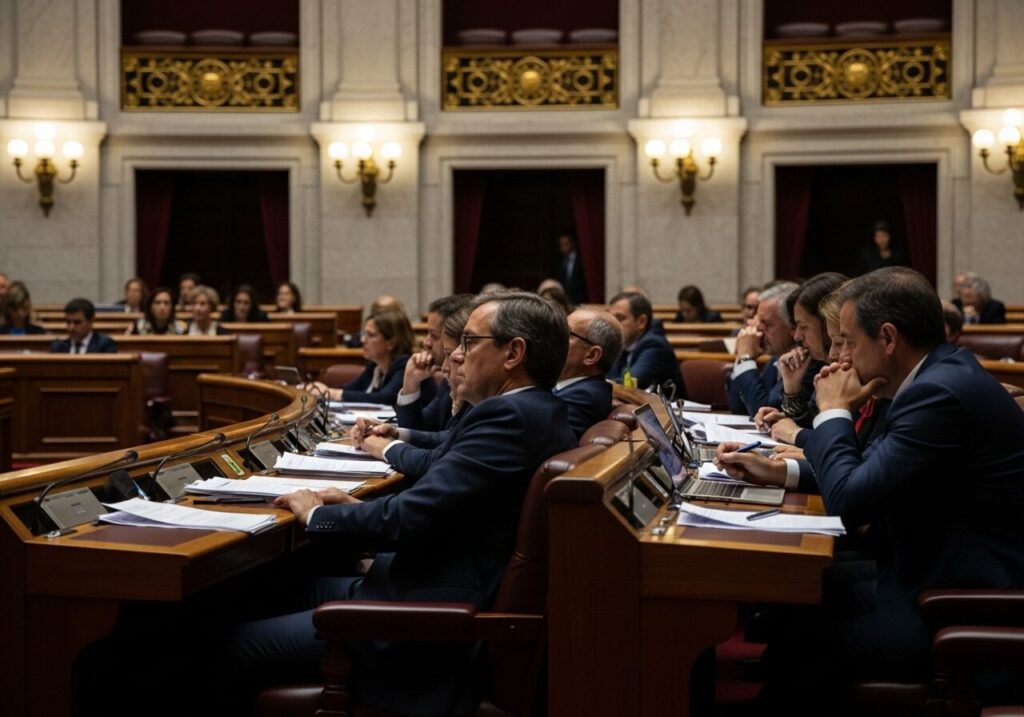The government passed the controversial Foreigners Law with help from the Chega party, changing the rules for immigrants and visa holders.
The new Portugal immigration law was approved in Parliament, marking a significant shift in the country’s approach to migration. The vote passed with support from the ruling coalition and the far-right Chega party, despite strong opposition from the Socialist Party (PS) and other left-wing groups. The final text, which still needs presidential sanction and publication, will impact family reunification, work visas, and the overall process for obtaining residency in Portugal.
The Vote and the Political Fallout
The vote on September 30, 2025, was highly charged. The government, led by Prime Minister Luís Montenegro, secured the necessary majority only after negotiating with Chega and the Liberal Initiative (IL), both of which voted in favor.
The Socialist Party (PS) voted against the final version, with leader José Luís Carneiro criticizing the government for making an “electoralist” deal with the far-right ahead of municipal elections. The PS argued that the government failed to include their proposals, which they claimed would have been better for the country.
The approval confirms a political alignment that many observers found concerning. The Chega party, whose deputy Rita Matias signaled a positive vote while attacking immigrants and promoting “remigration,” was instrumental in passing the legislation. The Liberal Initiative also voted in favor, criticizing previous migration policies as having failed.
The new law is a revision of the existing Foreigners Law, focusing on points previously rejected by the Constitutional Court. While the exact final text is not yet public, the negotiations confirmed changes related to family reunification and the job search visa process.
What Happens Next for Immigrants
The immediate impact of the new Portugal immigration law is uncertainty, followed by a period of adjustment once the law is published.
The approved diploma now moves to President Marcelo Rebelo de Sousa, who has eight days to review it. The President previously indicated he would likely sanction the legislation, stating he rarely vetoes laws or sends them back to the Constitutional Court (TC).
Once sanctioned, the law must be published in the Diário da República (DRE), Portugal’s official gazette. The law will take effect either immediately upon publication or on a specified date shortly after.
For those currently in the process of applying for residency or visas, the changes will likely affect:
- Family Reunification: The law introduces new restrictions or requirements for family members joining residents in Portugal. While the government claimed sensitivity, especially regarding minor children, the final text is expected to tighten the rules compared to the previous system.
- Job Search Visas: The process for obtaining and converting job search visas (visto de procura de trabalho) is expected to be adjusted.
- Proof of Accommodation: The law may clarify or strengthen the requirements for proving stable accommodation, a frequent hurdle for visa applicants seeking residency permits from the AIMA (Agência para a Integração, Migrações e Asilo).
The Core Conflict: Regulation vs. Rights
The debate centered on two opposing views: the government’s push for “regulated immigration” and the opposition’s defense of migrant rights.
Minister António Leitão Amaro, who led the government’s defense, called the day “decisive,” arguing that the previous Socialist policy was “irresponsible” and harmful to immigrants. He stressed the need to “regulate and treat with humanism,” rejecting the instrumentalization of immigrants—a clear reference to Chega’s rhetoric.
However, the far-right’s influence was palpable. Chega had initially conditioned its support on a proposal to prohibit social support for immigrants until they had five years of residency. Although the government publicly rejected this specific proposal as unconstitutional and outside the scope of negotiation, the final vote outcome suggests a political trade-off was made to secure the law’s passage.
Parties on the left, including the PS, Livre, and Bloco de Esquerda, criticized the law for restricting family rights and attacking immigrants. The Livre party even suggested sending the approved text back to the Constitutional Court for further review.
What Readers Should Do Now
The most important step for anyone living in Portugal or planning to move there is to prepare for the new rules. Since the final text is not yet published, specific actions are difficult, but general compliance remains key.
The new Portugal immigration law signals a stricter environment. If you are waiting for a visa or residency decision, ensure all your documentation is impeccable.
- Review Your Documents: Double-check the validity and completeness of your passport, criminal records, and proof of funds.
- Secure Accommodation: If you are using a rental contract (contrato de arrendamento) as proof of address, ensure it is properly registered with the tax authority (Finanças). Unregistered leases are a major cause of visa rejection.
- Stay Informed: The law will only take effect after publication in the Diário da República. Monitor official sources for the exact date and the final text.
- Seek Expert Advice: Given the political volatility and the complexity of the new rules, consulting a lawyer or immigration specialist is highly recommended to understand how the changes affect your specific visa or residency application.
This legislative change is a direct result of the political shift in Portugal, prioritizing stricter controls over the previous, more flexible system. The cost of non-compliance is high, potentially leading to delays or rejection of residency applications.
Bottom Line / Key Takeaway
The new Portugal immigration law passed with far-right support, signaling a move toward stricter regulation of residency and family reunification. Do not wait for the law to take effect; ensure your visa and residency paperwork is fully compliant and registered now to avoid being caught by the new, tougher rules.
Source:
Lima, A. (2025, September 30). Lei dos Estrangeiros aprovada com apoio do Chega. Diário de Notícias.


